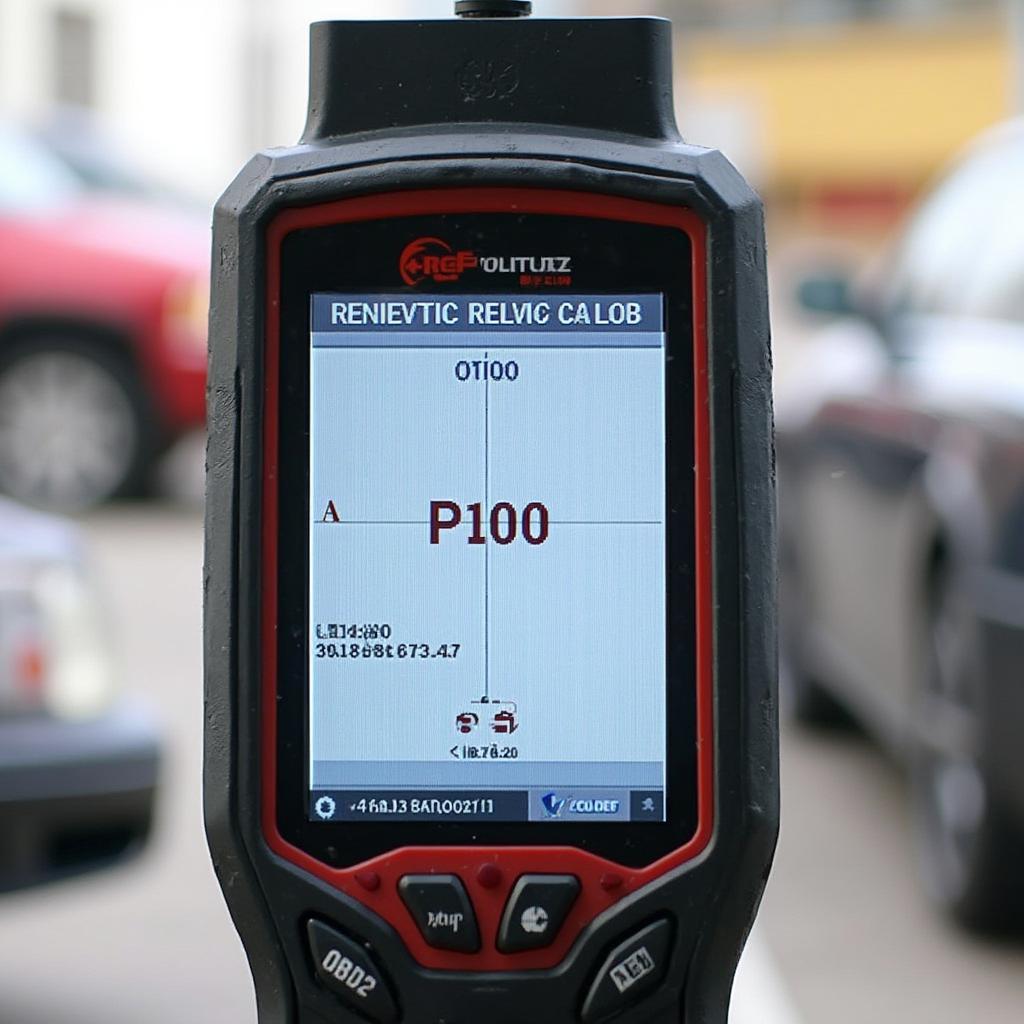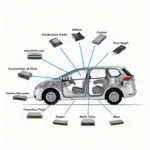The OBD2 code P1100 indicates an intermittent problem with your vehicle’s Mass Air Flow (MAF) sensor. This article provides a comprehensive guide to understanding this code, its causes, symptoms, diagnostic procedures, and potential solutions. We’ll cover everything you need to know to get your car back on track.
What Does OBD2 Code P1100 Mean?
The P1100 diagnostic trouble code specifically refers to an “Intermittent Mass Air Flow (MAF) Sensor Circuit Malfunction.” Unlike a hard fault, an intermittent problem means the issue isn’t constant. It comes and goes, making it sometimes tricky to diagnose. The MAF sensor measures the amount of air entering the engine, which is crucial for the engine control unit (ECU) to calculate the correct fuel-air mixture. A faulty or intermittent MAF sensor signal can lead to poor engine performance, reduced fuel economy, and even stalling.
Common Symptoms of P1100
Experiencing the P1100 code might present itself through various symptoms, and they can be just as intermittent as the code itself. These can include:
- Rough Idle: The engine might feel shaky or unstable at idle.
- Stalling: The engine might stall unexpectedly, especially at low speeds or idle.
- Hesitation on Acceleration: The car might hesitate or stumble when you press the accelerator.
- Poor Fuel Economy: You might notice a decrease in your miles per gallon.
- Check Engine Light: The check engine light will illuminate on your dashboard.
Causes of OBD2 Code P1100
Several factors can contribute to a P1100 code. Here are some of the most common culprits:
- Loose or Damaged MAF Sensor Connector: A loose connection can interrupt the signal, causing the intermittent fault.
- Wiring Issues: Damaged or corroded wiring in the MAF sensor circuit can also lead to an intermittent signal.
- Vacuum Leaks: Leaks in the intake system can disrupt airflow readings, confusing the MAF sensor.
- Dirty MAF Sensor: A contaminated MAF sensor can provide inaccurate readings, triggering the P1100 code.
- Failing MAF Sensor: Sometimes, the sensor itself is faulty and needs replacement.
“Intermittent issues are often the most challenging to diagnose,” says John Miller, a seasoned automotive diagnostician. “With P1100, it’s crucial to thoroughly inspect the wiring and connections before condemning the MAF sensor itself.”
How to Diagnose OBD2 Code P1100
Diagnosing an intermittent issue requires patience and a systematic approach:
- Read the Code: Use an OBD2 scanner to confirm the P1100 code.
- Inspect the Wiring: Carefully check the MAF sensor connector and wiring harness for any damage, looseness, or corrosion.
- Check for Vacuum Leaks: Inspect the intake system for any leaks.
- Clean the MAF Sensor: Use a specialized MAF sensor cleaner to remove any dirt or debris.
- Test the MAF Sensor: Use a multimeter or an advanced scan tool to test the sensor’s output voltage.
Fixing OBD2 Code P1100
Depending on the diagnosis, the solution might involve:
- Repairing or Replacing Wiring: Fix any damaged wiring or replace the connector.
- Fixing Vacuum Leaks: Seal any leaks in the intake system.
- Cleaning the MAF Sensor: A simple cleaning can often resolve the issue.
- Replacing the MAF Sensor: If the sensor is faulty, replacement is necessary.
“Don’t underestimate the importance of using the correct MAF sensor for your specific vehicle,” advises Maria Sanchez, an experienced automotive technician. “Using the wrong sensor can lead to further performance issues.”
Conclusion
The OBD2 code P1100, while indicating an intermittent issue, shouldn’t be ignored. By understanding its potential causes and following the diagnostic steps outlined above, you can effectively address the problem and restore your vehicle’s performance. Remember, a properly functioning MAF sensor is crucial for optimal engine operation and fuel efficiency.
FAQ
- Can I drive with a P1100 code? Yes, but it’s best to address the issue as soon as possible to avoid potential further damage or reduced performance.
- How much does it cost to replace a MAF sensor? The cost varies depending on the vehicle and the specific sensor, but it typically ranges from $100 to $300.
- Can a dirty air filter cause a P1100 code? While a dirty air filter itself doesn’t directly cause P1100, it can contribute to MAF sensor contamination.
- How often should I clean my MAF sensor? Cleaning every 30,000 miles or as needed is generally recommended.
- Is it hard to replace a MAF sensor myself? It’s a relatively straightforward procedure for many vehicles, but if you’re not comfortable working on your car, it’s best to consult a professional.
- What other codes are related to the MAF sensor? Codes like P0100, P0101, P0102, and P0103 are also related to the MAF sensor circuit.
- Can I use any cleaner on my MAF sensor? No, use only a specialized MAF sensor cleaner to avoid damaging the sensitive components.
Need help with your car troubles? Reach us on WhatsApp: +1(641)206-8880, Email: [email protected] or visit our workshop at 789 Elm Street, San Francisco, CA 94102, USA. Our customer service team is available 24/7.


